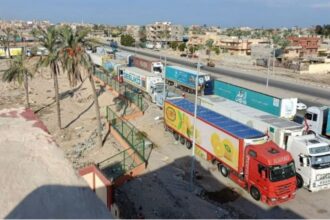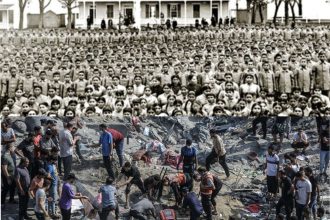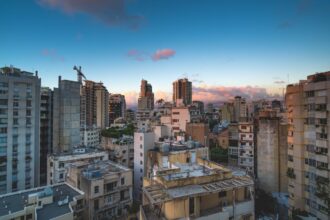Israeli Foreign Minister talks about Iran’s ‘threat’ to regional stability with Egyptian counterpart.
Israeli Foreign Minister Israel Katz stated that he had a discussion with his Egyptian counterpart, Sameh Shoukry, where he underscored Israel’s right to defend itself against threats from Iran.
Katz expressed in his statement, “I emphasized that Iran and its proxies pose a major threat to the stability in the Middle East.”
He added, “It is crucial for moderate nations in the region, as well as the international community, to respond to Iran’s hostile actions. Our partnership with Egypt is vital, and we are committed to collaborating further to uphold regional stability and security.”
Former official: Israel to delay response to Iran’s attack
Alon Liel, a former director of Israel’s foreign ministry, suggested that Israel might not immediately retaliate against Iran’s recent attack. He commented that the situation would likely stabilize over the next 24 hours and Israel’s focus would shift back to its ongoing operations in Gaza’s Rafah region.
According to Liel, speaking to Al Jazeera, the war cabinet has not approved a response, influenced significantly by the United States. He indicated that Israel would temporarily halt its response to Iran and concentrate on operations in Gaza, particularly the release of captives and addressing the presence of Hamas battalions.
Liel also mentioned that Prime Minister Netanyahu might leverage the current wave of support for Israel following the Iranian attack to intensify actions in Rafah. However, he emphasized that any significant moves would require close coordination with the United States, which he noted as a complicating factor for Netanyahu in claiming victory in the conflict.
Iran has issued a warning to Israel and the US, stating that it will respond severely if there is any retaliation.
Iran has issued a stern warning to Israel and the United States, cautioning against retaliation following Tehran’s overnight drone and missile strikes. Iranian President Ebrahim Raisi emphasized that any reckless actions by Israel or its allies would meet with a decisive and much stronger counter-response. This statement was echoed by Major-General Mohammad Bagheri, who indicated on state television that a more substantial reaction awaits should Israel retaliate.
Bagheri highlighted that Iran’s recent attack on Israel met all its objectives and that Iran does not plan further actions unless provoked. Additionally, he cautioned the US against supporting any Israeli retaliation, noting that such actions could lead to Iran targeting US bases.
The commander of the Islamic Revolutionary Guard Corps (IRGC), Hossein Salami, also stated that Iran would react to any Israeli attacks on its interests, officials, or citizens, with direct actions from Iran.
Iran’s permanent mission to the United Nations defended its actions as legitimate defense under the UN charter, suggesting that the issue could be considered resolved unless further provocations occur. The statement also advised the US to remain uninvolved, framing the situation as a bilateral issue between Iran and Israel.
Following the attacks, which were reportedly in retaliation for an Israeli strike on its embassy in Damascus on April 1, Iran claimed significant results, while Israel reported only modest damage and reopened its airspace. Israeli defense officials acknowledged intercepting most of the Iranian drones and missiles, and discussions on potential responses are ongoing.
Israel’s defense chief hinted that the conflict with Iran might continue, and an unnamed Israeli official suggested that Israel’s response to the attacks would be significant. However, despite the escalating rhetoric, some analysts suggest that there are opportunities for both sides to avoid a broader conflict.
Iran stated that its unprecedented attack on Israel was in retaliation for an Israeli assault on its consulate in Damascus two weeks earlier.
But what transpired subsequently?
- Israeli Foreign Minister talks about Iran’s ‘threat’ to regional stability with Egyptian counterpart.
- Former official: Israel to delay response to Iran’s attack
- Iran has issued a warning to Israel and the US, stating that it will respond severely if there is any retaliation.
- Iran stated that its unprecedented attack on Israel was in retaliation for an Israeli assault on its consulate in Damascus two weeks earlier.
- Russia expressed concern over the potential for further escalation in the Middle East following an attack by Iran.
- It can be said that the Iranians are now anticipating Israel’s reaction.
On April 1, an airstrike targeted Iran’s embassy complex in Damascus. The strike resulted in the deaths of 13 individuals, including two Iranian generals and five military advisors. Iran accused Israel of conducting the strike, which has frequently targeted Iranian positions in Syria. Israel has not confirmed or denied involvement in the consulate strike. The Islamic Revolutionary Guard Corps of Iran confirmed that the overnight operation, named Operation True Promise, was in response to “the Zionist entity’s crime of targeting the Iranian consulate in Syria.”
Russia expressed concern over the potential for further escalation in the Middle East following an attack by Iran.
“We are deeply concerned about another dangerous escalation in the Middle East and urge all parties to show restraint,” stated Russia’s Foreign Ministry, as reported in a Telegram post by a Russian news agency.
The ministry further noted, “We hope that the issues in the Middle East will be resolved by nations through political and diplomatic efforts.”
It can be said that the Iranians are now anticipating Israel’s reaction.
From observations and comments from ordinary Iranians in recent hours, there’s an initial relief that Iran has taken a stand against Israel for the first time in a four-decade-long covert conflict between the two nations. This marks Iran’s direct retaliation to what it labels as Israeli aggression.
While there is general satisfaction with Iran’s decision to respond, there is also concern about Israel’s potential actions in the future.
Many believe that Iran’s retaliation, which was a response to the events in Damascus on April 1, was justified and proportional. However, there is a perception that Israel, particularly under Netanyahu’s leadership, may use any pretext to strike Iran. Netanyahu has frequently described Iran as a major threat to Israel over the last two decades, suggesting that attacking Iran’s nuclear facilities could be a solution.Meanwhile, life in Iran continues as usual without any significant disruptions; the government hasn’t issued any alerts, and daily activities remain unchanged.
However, last night, as the operation began, there were long queues at gas stations and gatherings outside the British embassy and in Palestine Square in Tehran, indicating public support for the leadership’s decisions.
















